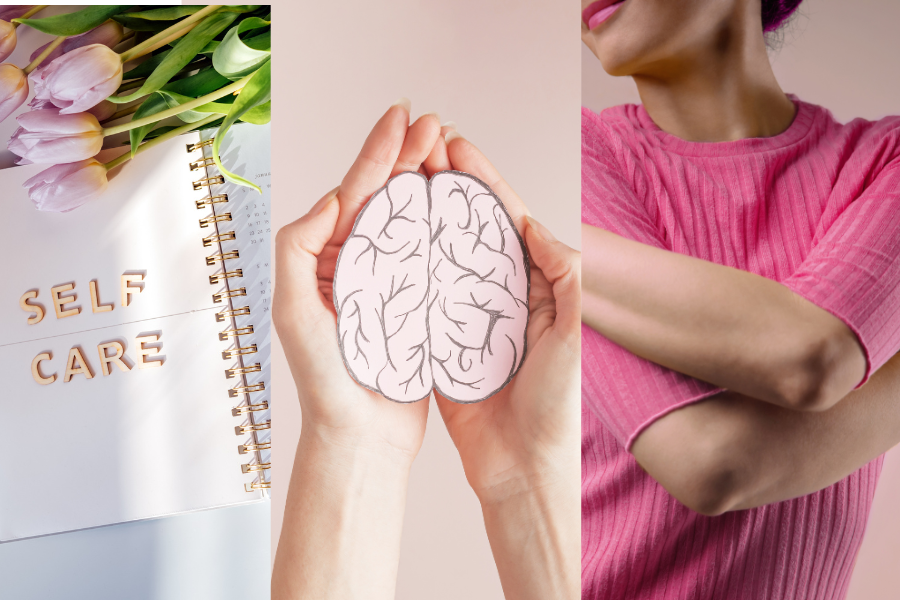In our busy lives, prioritizing mental health can often take a backseat. However, taking care of your mental well-being is crucial for overall happiness and productivity. Did you know that integrating regular mental health self-care practices can significantly reduce symptoms of anxiety and depression? In this guide, we’ll explore a variety of self-care strategies to help you maintain and improve your mental health. Let’s embark on this journey to better mental well-being together!
This post is a mental health self-care guide.
Understanding Mental Health Self-Care
Definition and Importance of Mental Health Self-Care
Mental health self-care involves practices and activities aimed at maintaining and improving mental and emotional well-being. These practices are essential because they help manage stress, prevent mental health issues, and promote overall happiness and stability. By prioritizing mental health self-care, individuals can better cope with life’s challenges and maintain a balanced and fulfilling life. A comprehensive mental health self-care guide can provide the necessary tools and strategies to support these efforts.
The Impact of Mental Health on Overall Well-Being
Mental health significantly influences overall well-being. Good mental health enhances quality of life, supports positive relationships, and boosts physical health. Conversely, poor mental health can lead to a range of problems, including chronic stress, anxiety, and physical health issues. Therefore, maintaining a mental health self-care guide is crucial for holistic well-being.
Recognizing the Signs That You Need Mental Health Self-Care
- Increased Stress: Feeling overwhelmed or unable to cope with daily tasks.
- Emotional Changes: Experiencing heightened emotions, such as irritability, sadness, or anxiety.
- Physical Symptoms: Noticing physical signs like fatigue, headaches, or changes in appetite.
- Social Withdrawal: Avoiding social interactions and feeling isolated.
Daily Mindfulness Practices
Benefits of Mindfulness for Mental Health
Mindfulness practices are powerful tools for improving mental health. They help reduce stress, enhance emotional regulation, and increase self-awareness. Regular mindfulness practice can lead to better mental clarity and overall well-being. Incorporating these practices into your mental health self-care guide can be highly beneficial.
Simple Mindfulness Exercises to Start Your Day
- Mindful Breathing: Spend a few minutes focusing on your breath, inhaling deeply and exhaling slowly.
- Body Scan: Take a moment to mentally scan your body from head to toe, noticing any areas of tension.
- Morning Gratitude: Reflect on three things you are grateful for as you begin your day.
Guided Meditation and Breathing Techniques
- Headspace: Offers guided meditations tailored to various mental health needs.
- Calm: Provides breathing exercises and meditation sessions to start your day calmly.
- Insight Timer: Features a wide range of guided meditations and breathing techniques.
Managing Stress and Anxiety
Identifying Stressors in Your Life
Recognizing the sources of stress is the first step in managing it effectively. Common stressors include work pressure, financial issues, relationship problems, and health concerns. Identifying these allows for targeted stress management strategies within your mental health self-care guide.
Effective Stress Management Techniques
- Time Management: Prioritize tasks and break them into manageable steps.
- Physical Activity: Engage in regular exercise to reduce stress hormones.
- Relaxation Techniques: Practice deep breathing, progressive muscle relaxation, or mindfulness meditation.
Tools and Apps for Anxiety Relief
- Pacifica: Helps track mood and provides cognitive behavioral therapy tools.
- Happify: Offers activities and games to reduce stress and improve well-being.
- Sanvello: Combines self-care, peer support, and therapy tools for anxiety relief.
Building a Support System
The Importance of Social Connections for Mental Health
Strong social connections are vital for mental health. They provide emotional support, reduce feelings of isolation, and enhance overall well-being. Engaging in regular social interactions is a key aspect of a mental health self-care guide.
How to Build and Maintain a Support Network
- Reach Out: Initiate contact with friends, family, or colleagues regularly.
- Join Groups: Participate in clubs, classes, or support groups that interest you.
- Be Supportive: Offer your support to others, which can strengthen mutual bonds.
Tips for Effective Communication and Seeking Help
- Be Open: Share your feelings and thoughts honestly with trusted individuals.
- Active Listening: Listen attentively and empathetically to others.
- Ask for Help: Don’t hesitate to seek help when needed; it’s a crucial part of mental health self-care.
Healthy Lifestyle Choices
The Connection Between Physical and Mental Health
Physical health and mental health are closely interconnected. Regular physical activity, a balanced diet, and adequate sleep all contribute to better mental health. Including these in your mental health self-care guide can significantly improve overall well-being.
Exercise Routines That Boost Mental Well-Being
- Cardio Workouts: Activities like running, swimming, or cycling boost endorphin levels.
- Strength Training: Helps improve mood and reduce anxiety.
- Yoga and Pilates: Promote relaxation and mental clarity.
Nutrition Tips for a Healthy Mind
- Balanced Diet: Eat a variety of nutrient-rich foods, including fruits, vegetables, lean proteins, and whole grains.
- Hydration: Drink plenty of water throughout the day.
- Limit Sugars and Processed Foods: Reduce intake of foods that can negatively impact mental health.
Journaling and Emotional Expression
Benefits of Journaling for Mental Clarity
Journaling is a powerful tool for mental clarity and emotional expression. It helps organize thoughts, reflect on experiences, and process emotions. Regular journaling can enhance self-awareness and reduce stress, making it a valuable component of your mental health self-care guide.
Different Types of Journaling
- Gratitude Journaling: Focus on positive aspects of your life.
- Reflective Journaling: Reflect on daily experiences and emotional responses.
- Bullet Journaling: Organize tasks, goals, and thoughts in a structured format.
Creative Ways to Express Emotions
- Art: Use drawing, painting, or other artistic activities to express feelings.
- Music: Play an instrument or listen to music that resonates with your emotions.
- Writing: Write poems, stories, or letters to express and process emotions.
Setting Boundaries and Saying No
Understanding the Importance of Boundaries for Mental Health
Setting boundaries is crucial for protecting mental health. It helps manage stress, prevent burnout, and maintain healthy relationships. Clear boundaries ensure that your needs are respected and met, making them a key element of a mental health self-care guide.
How to Set and Maintain Healthy Boundaries
- Identify Limits: Understand what you can and cannot tolerate.
- Communicate Clearly: Express your boundaries assertively but respectfully.
- Be Consistent: Maintain your boundaries even when challenged.
Practical Tips for Saying No Without Guilt
- Be Honest: Politely but firmly decline requests that overwhelm you.
- Offer Alternatives: Suggest other ways to help if possible.
- Practice Self-Compassion: Remind yourself that saying no is a vital part of self-care.
Relaxation and Pampering Techniques
The Role of Relaxation in Mental Health
Relaxation is essential for mental health as it helps reduce stress and promotes emotional well-being. Regular relaxation practices are crucial components of a mental health self-care guide.
Simple Ways to Pamper Yourself at Home
- Relaxing Bath: Use bath salts and essential oils.
- Facials: Apply masks and moisturizers.
- Manicures and Pedicures: Groom and paint your nails.
DIY Relaxation Techniques
- Aromatherapy: Use essential oils like lavender and chamomile to create a calming environment.
- Baths: Soak in a warm bath with Epsom salts and soothing scents.
- Music and Meditation: Listen to relaxing music or guided meditations.
Professional Help and Resources
When to Seek Professional Help
It’s important to recognize when self-care practices are not enough. Seek professional help if you experience persistent feelings of sadness, anxiety, or if mental health issues interfere with daily life. Knowing when to seek help is an essential part of any mental health self-care guide.
Types of Mental Health Professionals and How to Choose the Right One
- Psychiatrists: Medical doctors who can prescribe medication.
- Psychologists: Specialists in therapy and counseling.
- Therapists/Counselors: Provide talk therapy for various mental health issues.
Resources for Mental Health Support
- Hotlines: National Suicide Prevention Lifeline, Crisis Text Line.
- Websites: Mental Health America, NAMI.
- Support Groups: Local or online support groups for specific issues.
Creating a Personalized Mental Health Self-Care Plan
How to Develop a Self-Care Plan Tailored to Your Needs
- Self-Assessment: Identify your mental health needs and stressors.
- Set Goals: Define clear, realistic self-care goals.
- Choose Activities: Select activities that address your needs and fit your lifestyle.
Incorporating Self-Care into Your Daily Routine
- Schedule Self-Care: Dedicate specific times for self-care activities.
- Integrate Practices: Incorporate self-care into daily tasks, like mindfulness while commuting.
- Use Reminders: Set alarms or notes to prompt self-care activities.
Adjusting Your Plan as Your Needs Change
- Regular Review: Assess your self-care plan regularly to ensure it meets your current needs.
- Be Flexible: Adapt your plan to accommodate changes in your life or circumstances.
- Seek Feedback: Consult with trusted individuals or professionals for insights and adjustments.
By understanding and implementing this mental health self-care guide, you can create a balanced and fulfilling routine that supports your overall mental health and well-being.
Mental Health Self-Care Guide Wrap Up:
Taking care of your mental health is a continuous journey, and integrating self-care practices into your daily life can make a significant difference. From mindfulness to professional support, find what works best for you and commit to making it a priority. Remember, your mental health matters, and you deserve to feel your best. Start implementing these strategies today and watch your mental well-being flourish. Ready to take the first step? Follow this guide and create a self-care routine that nurtures your mind, body, and soul.
This post was a Mental Health Self-Care Guide.
Other Posts You Might Like:


